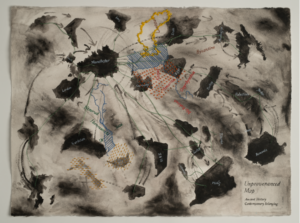Caitlin Nunn, PhD (Manchester Metropolitan University)
c.nunn@mmu.ac.uk
NEOS Issue 15, Volume 2, Fall 2023
Return to Current Issue Table of Contents
Every Saturday morning, we gathered in the university building, transforming sterile teaching spaces into a homely mess of drop sheets, snacks, clay, headphones, markers, coats, paint, phones, post-it notes… Researchers/artists/young people flowed in and out, charting paths through the chaos to land in quiet corners or noisy collectives of thinking and making and sharing. (University researcher)1
Participatory arts-based research encompasses a wide range of practices in which community members collaborate in producing research through art making (Nunn 2022). In combining participatory and arts-based paradigms, such approaches hold the potential to be doubly transformative: troubling the borders of both ‘researcher’ and ‘research’. This re-imagining of who can produce knowledge and what forms this knowledge may take is particularly critical in research with refugee-background youth people, whose intersectional marginality as (racialized, gendered) young people and (forced) migrants means that their ideas and experiences are routinely authored by others – often within discourses constructed to discredit them (Anas et al. 2022).
there are certain questions that I never really took the time to ask. And that includes the way that our cultures are exploited, and people pick and choose what they love about us… [W]e are always recognised…as the brown people that took from this country, instead of adding to it. (Youth researcher)
How do we ensure that young people’s knowledge, experience, and expression are taken seriously, and that research doesn’t become another site in which they are constructed by others? In seeking to name and transform the power relations that mediate academic knowledge production, participatory arts-based research can challenge the primacy of White Western epistemologies, recognizing the lived experiences of refugee-background young people not as a disadvantage to be researched, but as valid and valuable forms of knowledge that can open new modes of inquiry and action (Cammarota and Fine 2010).
Stories have been a huge part of my life. I grew up hearing my grandfather’s stories of Palestine and how the disastrous 1948 Nakba…impacted his and his family’s lives. My grandmother would sing my Syrian village’s tribal songs that told the stories of our ancestors… Through my artwork, I show the stories of two [ancient] lamps, valued but forgotten, wanted but unused… a metaphor for the shared experiences of migrants and displaced people. (Senna Yousef)
Arts-based approaches draw upon affective, embodied, sensuous ways of knowing, transcending the limits of words to surface what cannot be easily said (Conquergood 2002). Further, they encourage thinking and feeling between and beyond what is ‘known’, (re)making the world through imaginative interventions. The research artifacts emerging from such processes can take us beyond the borders of the academy to speak to and with different communities. It can be uncomfortable – even risky – work, and thus requires great care (Lenette 2019). But at a time when there is urgent need for new ways of seeing, listening, knowing, and feeling, attending to young people through participatory arts-based research offers a hopeful practice.
This map invites viewers to encounter the world from the unique perspectives of these people and objects, who have arrived in this place across shifting eras and borders, and in doing so, created new pathways to belonging. (Jina Lee)
 Figure: “Unprovenanced Map”. By Jina Lee and based on ideas and stories from the Ancient History, Contemporary Belonging youth research team. Graphite/charcoal, threading on paper (2023)
Figure: “Unprovenanced Map”. By Jina Lee and based on ideas and stories from the Ancient History, Contemporary Belonging youth research team. Graphite/charcoal, threading on paper (2023)
Notes
1 Italicised excerpts are taken from the UKRI-funded Ancient History, Contemporary Belonging research project. Further information and an online version of the project’s exhibition at Manchester Museum can be viewed here. Thank you to Dr Jennifer Cromwell, Dr Sarah Linn, Jina Lee, and the youth research team for allowing me to share our work.
References
Anas, David Cường Nguyễn, & Caitlin Nunn. 2022. Calais Again. Sociological Research Online, 27(3): 569-573.
Cammarota, Julio. and Michelle Fine. eds., 2010. Revolutionizing Education: Youth Participatory Action Research in Motion. Routledge.
Conquergood, Lorne Dwight, 2002. Performance Studies: Interventions and Radical Research. TDR/The Drama Review, 46(2): 145-156.
Lenette, Caroline, 2019. Arts-Based Methods in Refugee Research: Creating Sanctuary. Singapur: Springer.
Nunn, Caitlin, 2022. The Participatory Arts-Based Research Project as an Exceptional Sphere of Belonging. Qualitative Research, 22(2): 251-268.
Author contact: Caitlin Nunn, PhD (Manchester Metropolitan University), c.nunn@mmu.ac.uk
To cite this article: Nunn, Caitlin. 2023. “Troubling Research: Participatory Arts-Based Research with Refugee-Background Young People.” NEOS 15 (2).
To link this article: https://acyig.americananthro.org/neosvol15iss2fall23/Nunn
